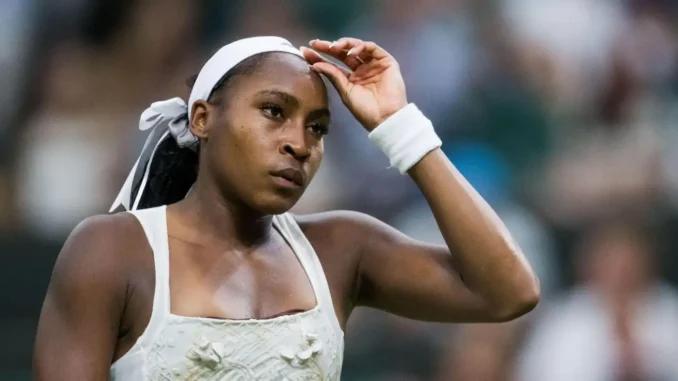
In a stunning turn of events at the 2025 Wimbledon Championships, American tennis sensation Coco Gauff, the No. 2 seed and reigning French Open champion, suffered a first-round defeat that left fans and analysts reeling. On a rain-soaked Tuesday, July 1, 2025, at the All England Lawn Tennis and Croquet Club, Gauff fell 7-6(3), 6-1 to Ukraine’s Dayana Yastremska, ranked world No. 42, in a match that exposed the young star’s ongoing struggles on grass courts. The upset, one of several high-profile shocks on the day, marked only the third time in the Open era that a French Open champion has exited Wimbledon in the first round, joining the ranks of Justine Henin (2005) and Francesca Schiavone (2010).
The match, played under the roof on Court No. 1 after being moved from its original Centre Court slot, showcased Gauff’s difficulties adapting to the slick, low-bouncing grass surface. Fresh off her Roland Garros triumph just three weeks prior, where she defeated world No. 1 Aryna Sabalenka in a grueling final, Gauff appeared out of sync. Her performance was marred by nine double faults and a staggering 29 unforced errors, contrasted by a mere six winners. Yastremska, by comparison, was a force of nature, unleashing 16 winners with her powerful forehand and maintaining relentless pressure. “I was really on fire,” Yastremska declared post-match, her voice brimming with confidence. “Playing against Coco, it is something special. She’s a great player and a great person.”
Gauff’s grass-court woes are not new. Despite her breakout performance at Wimbledon in 2019, when she stunned Venus Williams at age 15 and reached the fourth round, the American has yet to advance past that stage at the All England Club. Wimbledon remains the only Grand Slam where she has not reached at least the semifinals. The transition from clay, where her athleticism and topspin-heavy game thrive, to grass, which demands aggressive play and precise footwork, has proven a persistent challenge. “I feel like mentally I was a little bit overwhelmed with everything that came afterwards,” Gauff admitted, reflecting on the whirlwind following her French Open victory. “I didn’t feel like I had enough time to celebrate and also get back into it.”
The 21-year-old’s emotional post-match press conference revealed a player grappling with disappointment but determined to learn from the setback. “I maybe could have used more matches,” she said, hinting that her limited grass-court preparation—marked by an early exit in Berlin and just two days of training on the surface—may have hindered her performance. Yastremska, who reached a grass-court final in Nottingham earlier in the season, capitalized on her recent momentum, displaying a comfort on the surface that Gauff lacked. “I love playing on grass,” Yastremska noted. “This year, we are kind of friends.”
Gauff’s serve, a known vulnerability, was a particular liability against Yastremska’s aggressive style. The American struggled to find rhythm, with her double faults piling up and her usually reliable forehand faltering under pressure. Three consecutive forehand errors in the second set’s fourth game underscored her discomfort, as Yastremska’s low, precise shots kept Gauff on the defensive. The Ukrainian’s intensity never wavered, and her victory in just 78 minutes sent a clear message: on grass, adaptability and aggression reign supreme.
Despite the loss, Gauff remained resolute. “I’m not going to dwell on this too long because I want to do well at the US Open,” she said, her eyes welling up but her tone defiant. She acknowledged the need for adjustments, particularly in her grass-court preparation, and vowed to return stronger. “I’m not someone who wants to write myself off grass this early in my career, but I definitely need to make changes if I want to be successful here,” she added. The defeat, while painful, is a reminder of the challenges of transitioning between surfaces, a feat only Serena Williams has mastered in the past decade by winning both Roland Garros and Wimbledon in 2015.
As Gauff shifts her focus to the hard-court season and her pursuit of a second US Open title, the tennis world watches with bated breath. Her resilience and willingness to confront her weaknesses suggest this setback is merely a chapter in a career destined for greatness. Meanwhile, Yastremska, buoyed by her career-defining win, advances to face Anastasia Zakharova in the second round, carrying the momentum of a player who has found her stride on the hallowed grass of Wimbledon.
Leave a Reply